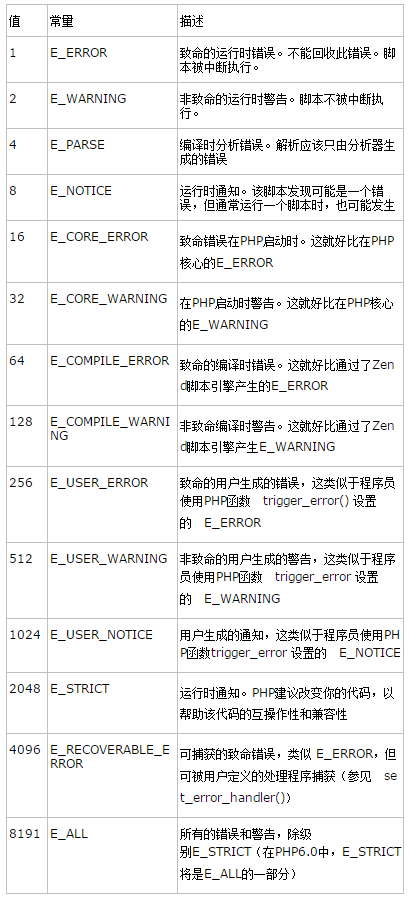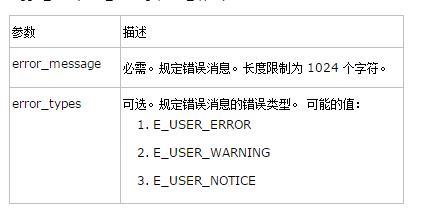PHP error handling mechanism
In the daily project development process, there will always be some unexpected abnormal errors. If we do not deal with them relatively well, the program will look very unprofessional, and it is likely to become someone else's. Valid information for attacking the system; some error exceptions will terminate script execution. If there is no error message at this time, then we can only look at the code from the beginning. We must know that hundreds or thousands of lines of code in the project are very important to us. What a terrifying thing, so how can we quickly and accurately locate exceptions and errors during the project development process, and handle them accordingly? This article uses my own understanding of error and exception handling, and then shares it with everyone to learn from each other. Communicate and serve as a reminder.
System error handler:
PHP Under normal circumstances, errors will be output normally, but in some frameworks, it may affect the error output. It may be that the framework itself has its own processing mechanism. , or it may be processed in the code, usually these function settings:
1.error_reporting(); Set the error level of PHP and return the current level
error_reporting(report_level)
If the parameter level is not specified, the current error level will be returned. The following items are possible values of level:

It is worth noting here that when $level is 0, error output is turned off, that is, no errors will be output.
2.set_error_handler()
Definition and usage
The set_error_handler() function sets a user-defined error handling function.
This function is used to create the user's own error handling method during runtime.
This function will return the old error handler, or null if it fails.
Syntax
set_error_handler(error_function,error_types)

Tip: If this function is used, standard PHP errors will be completely bypassed Handler function, if necessary, the user-defined error handler must terminate (die()) the script,
Note: If an error occurs before the script is executed, since the custom program has not been registered at that time, it This custom error handler will not be used.
The test code is as follows:
/**
*
* @param type $error_level 错误级别
* @param type $error_message 错误信息
* @param type $error_file 可选 错误文件
* @param type $error_line 可选 错误行
* @param type $error_context 可选。规定一个数组,包含了当错误发生时在用的每个变量以及它们的值。
*/
function my_error($error_level, $error_message, $error_file, $error_line, $error_context) {
echo date('Y-m-d H:i:s') . $error_level . $error_message . $error_file . $error_line;
var_dump($error_context);
}
set_error_handler('my_error', E_ALL);
print_r($a);//From the above case, we can know that when registering the my_error method, the system will automatically overwrite the original error handling error_fuction() method
Custom Error Trigger
Definition and Usage
trigger_error() function creates a user-defined error message.
trigger_error() is used to trigger an error message under user-specified conditions. It is used with the built-in error handler or with user-defined functions created with the set_error_handler() function.
If an illegal error type is specified, this function returns false, otherwise it returns true.
Syntax
trigger_error(error_message,error_types)

The test code is as follows:
/**
*
* @param type $level
* @param type $msg
*/
function my_error($level, $msg) {
switch ($level) {
case E_USER_ERROR:
echo "ERROR:<br/>";
break;
case E_USER_WARNING:
echo "WARNING:<br/>";
break;
case E_USER_NOTICE:
echo "NOTICE:<br/>";
break;
default:
break;
}
echo "错误编号:" . $level . " <br/>";
echo "错误信息:" . $msg;
}
//注册错误处理器
set_error_handler('my_error');
if (89 > 8) {
//调用错误触发器
trigger_error('这是错误啊', E_USER_WARNING);
}The running results are as follows:
WARNING:
Error number: 512
Error message: This is an error
The above is the entire content of this article, I hope you all like it.
For more articles related to PHP error handling mechanism, please pay attention to the PHP Chinese website!

Hot AI Tools

Undresser.AI Undress
AI-powered app for creating realistic nude photos

AI Clothes Remover
Online AI tool for removing clothes from photos.

Undress AI Tool
Undress images for free

Clothoff.io
AI clothes remover

Video Face Swap
Swap faces in any video effortlessly with our completely free AI face swap tool!

Hot Article

Hot Tools

Notepad++7.3.1
Easy-to-use and free code editor

SublimeText3 Chinese version
Chinese version, very easy to use

Zend Studio 13.0.1
Powerful PHP integrated development environment

Dreamweaver CS6
Visual web development tools

SublimeText3 Mac version
God-level code editing software (SublimeText3)

Hot Topics
 1664
1664
 14
14
 1423
1423
 52
52
 1318
1318
 25
25
 1268
1268
 29
29
 1248
1248
 24
24
 PHP and Python: Comparing Two Popular Programming Languages
Apr 14, 2025 am 12:13 AM
PHP and Python: Comparing Two Popular Programming Languages
Apr 14, 2025 am 12:13 AM
PHP and Python each have their own advantages, and choose according to project requirements. 1.PHP is suitable for web development, especially for rapid development and maintenance of websites. 2. Python is suitable for data science, machine learning and artificial intelligence, with concise syntax and suitable for beginners.
 Explain secure password hashing in PHP (e.g., password_hash, password_verify). Why not use MD5 or SHA1?
Apr 17, 2025 am 12:06 AM
Explain secure password hashing in PHP (e.g., password_hash, password_verify). Why not use MD5 or SHA1?
Apr 17, 2025 am 12:06 AM
In PHP, password_hash and password_verify functions should be used to implement secure password hashing, and MD5 or SHA1 should not be used. 1) password_hash generates a hash containing salt values to enhance security. 2) Password_verify verify password and ensure security by comparing hash values. 3) MD5 and SHA1 are vulnerable and lack salt values, and are not suitable for modern password security.
 PHP in Action: Real-World Examples and Applications
Apr 14, 2025 am 12:19 AM
PHP in Action: Real-World Examples and Applications
Apr 14, 2025 am 12:19 AM
PHP is widely used in e-commerce, content management systems and API development. 1) E-commerce: used for shopping cart function and payment processing. 2) Content management system: used for dynamic content generation and user management. 3) API development: used for RESTful API development and API security. Through performance optimization and best practices, the efficiency and maintainability of PHP applications are improved.
 PHP: A Key Language for Web Development
Apr 13, 2025 am 12:08 AM
PHP: A Key Language for Web Development
Apr 13, 2025 am 12:08 AM
PHP is a scripting language widely used on the server side, especially suitable for web development. 1.PHP can embed HTML, process HTTP requests and responses, and supports a variety of databases. 2.PHP is used to generate dynamic web content, process form data, access databases, etc., with strong community support and open source resources. 3. PHP is an interpreted language, and the execution process includes lexical analysis, grammatical analysis, compilation and execution. 4.PHP can be combined with MySQL for advanced applications such as user registration systems. 5. When debugging PHP, you can use functions such as error_reporting() and var_dump(). 6. Optimize PHP code to use caching mechanisms, optimize database queries and use built-in functions. 7
 The Enduring Relevance of PHP: Is It Still Alive?
Apr 14, 2025 am 12:12 AM
The Enduring Relevance of PHP: Is It Still Alive?
Apr 14, 2025 am 12:12 AM
PHP is still dynamic and still occupies an important position in the field of modern programming. 1) PHP's simplicity and powerful community support make it widely used in web development; 2) Its flexibility and stability make it outstanding in handling web forms, database operations and file processing; 3) PHP is constantly evolving and optimizing, suitable for beginners and experienced developers.
 How does PHP type hinting work, including scalar types, return types, union types, and nullable types?
Apr 17, 2025 am 12:25 AM
How does PHP type hinting work, including scalar types, return types, union types, and nullable types?
Apr 17, 2025 am 12:25 AM
PHP type prompts to improve code quality and readability. 1) Scalar type tips: Since PHP7.0, basic data types are allowed to be specified in function parameters, such as int, float, etc. 2) Return type prompt: Ensure the consistency of the function return value type. 3) Union type prompt: Since PHP8.0, multiple types are allowed to be specified in function parameters or return values. 4) Nullable type prompt: Allows to include null values and handle functions that may return null values.
 PHP and Python: Code Examples and Comparison
Apr 15, 2025 am 12:07 AM
PHP and Python: Code Examples and Comparison
Apr 15, 2025 am 12:07 AM
PHP and Python have their own advantages and disadvantages, and the choice depends on project needs and personal preferences. 1.PHP is suitable for rapid development and maintenance of large-scale web applications. 2. Python dominates the field of data science and machine learning.
 PHP vs. Python: Understanding the Differences
Apr 11, 2025 am 12:15 AM
PHP vs. Python: Understanding the Differences
Apr 11, 2025 am 12:15 AM
PHP and Python each have their own advantages, and the choice should be based on project requirements. 1.PHP is suitable for web development, with simple syntax and high execution efficiency. 2. Python is suitable for data science and machine learning, with concise syntax and rich libraries.




